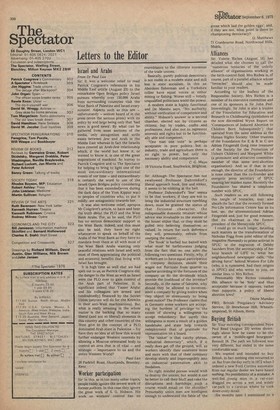Worker participation
Sir: In this, as in too many other topics, people today ignore the severe work of former authors. In this case they ignore the great work of S. G. Hobson. His work on workers' control has no resemblance to the illiterate nonsense of the trade unions.
Basically, purely political democracy is not viable in a modern state and still less is state socialism. In this an Aberdeen fisherman and a Yorkshire collier have equal voices in either mining or fishing. Worse still — totally unqualified politicians wield the power.
A modern state is highly functional and De Maestu says, "No authority without verification of competence and ability." Hobson's answer is a second chamber, elected not by citizens as citizens, but by trades, crafts and professions. And also not to represent interests and rights but to be functionally able and competent.
"One man one vote" is perhaps acceptable in pure politics but in industry, trade and agriculture there is no right to power, but only the necessary ability and competence.
C. G. Mayo 19 Victoria Road, Southwick, Brighton
Sir: Although The Spectator has not swallowed Professor Dahrendorf's liberal approach hook, line and sinker, it seems to be nibbling at the bait,
Professor Dahrendorfs 'line' seems to be that workers, if they are not to bring the industrial structure tumbling .down, must be granted the status of that fictional character, the indispensable domestic retainer whose advice was invaluable to the master of the house: either that, or they must be gulled into believing themselves so valued. In return for such deference they will, presumably, refrain from usurping the master.
The 'hook' is barbed but baited with what must be barbiturates judging from the fact that no one asks the following two questions. Firstly, why, if workers are to have equal participation in company decisions, should their wages not fluctuate from quarter to quarter according to the fortunes of the company as do the dividends which provide the livelihood of the investor? Secondly, in the name of fairness, why should they be allowed to inconvenience a company by giving notice when they object so strenuously to being given notice? The Professor claims that in Germany some workers are accepting the burdens of privilege to the extent of showing a willingness to accept redundancy. But surely this willingness is more a result of a golden handshake and state help towards redeployment than of gratitude for representation on a board.
The 'sinker' is that catchy phrase, "industrial democracy", which, if it really does get off the ground, will, as workers identify their existence more and more with that of their company develop slowly and imperceptibly into an industrial paternalism akin to feudalism.
No right minded person would wish to destroy the unions, but would it not be better to call their bluff and take the disruptions and hardships such a course would entail on the shoulder? Presumably union men are intelligent enough to understand the fable of the goose which laid the golden eggs': and, if they are not, what point is there to championing democracy?
0. Matthews 71 Cranbourne Road, Northwood Hills, Middx.


































 Previous page
Previous page